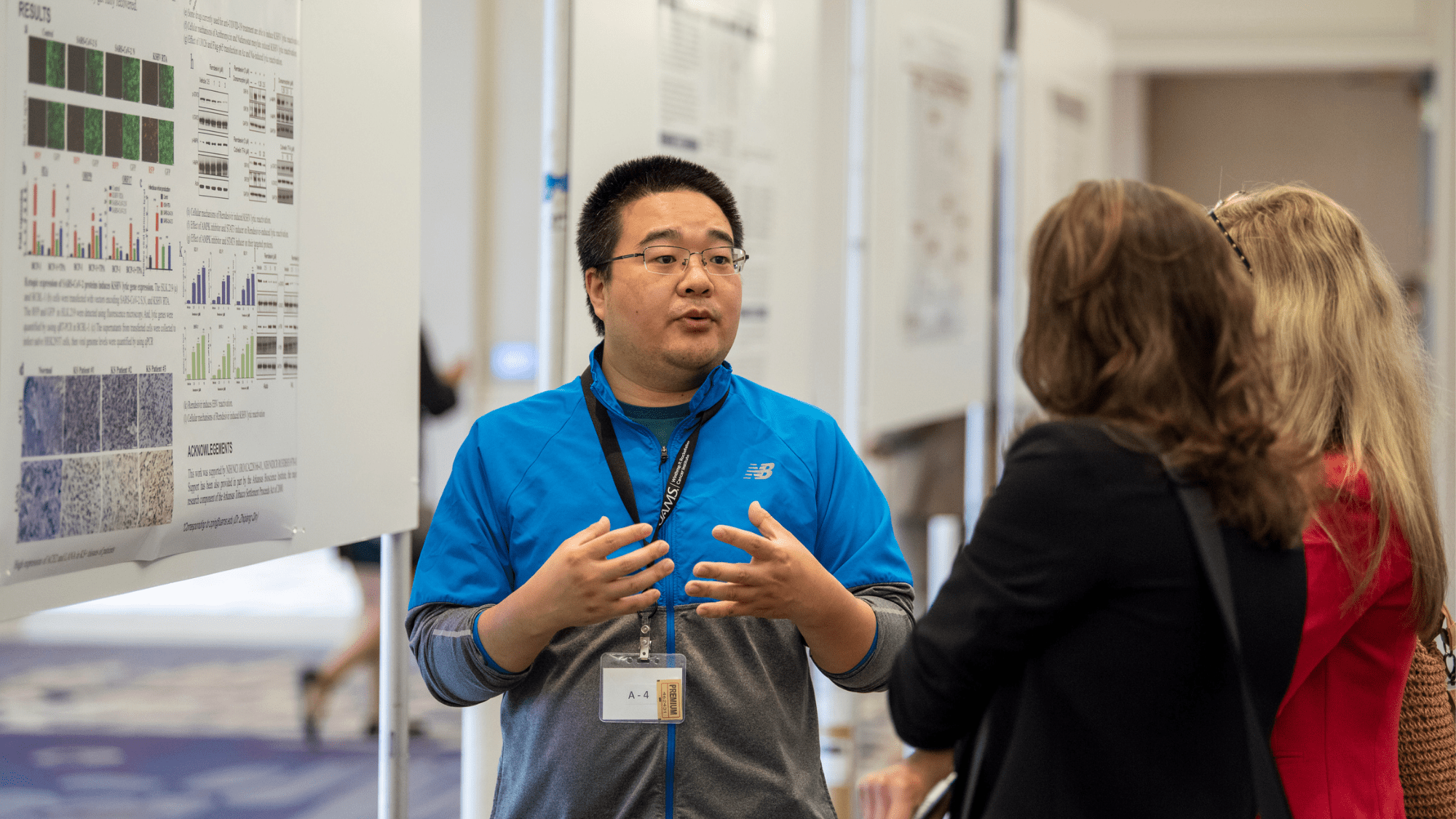Cancer Institute Retreat Highlights Novel Therapeutic Targets and Agents
| The Winthrop P. Rockefeller Cancer Institute held its second annual scientific research retreat May 26 at the Marriott Hotel in Little Rock. More than 140 scientists gathered in person for the first time in two years.
The retreat theme, “Molecular Targets and Cancer Therapeutics,” reflects the growth in the identification of new and novel molecular targets along with the development of important therapeutic agents within the Cancer Institute. This is an important mission for the Cancer Institute.
“We sought to highlight collaborative, team-driven and transdisciplinary research that’s being carried out by members of the Winthrop P. Rockefeller Cancer Institute,” said Deputy Director Alan Tackett, Ph.D.
“Events like this that allow us to share information and learn from each other are extremely important to all of us involved in research,” said UAMS Chancellor Cam Patterson, M.D., MBA, who opened the event.
Cancer Institute Director Michael Birrer, M.D., Ph.D., reviewed the progress that the Cancer Institute has made toward NCI designation. “I have never been more excited about what we have accomplished to date, including the tremendously successful recruitment of first-class scientists and the complete reorganization of the clinical trials.”
Oral presentations included:
- “Destruction of DNA-binding proteins by programmable O’PROTACS,” Hong-yu Li, Ph.D.
- “Molecular Targets and Therapeutics in Multiple Myeloma,” Fenghuang Zhan, M.D., Ph.D.
- “Liquid Biopsy: State of the Science,” Don Johann, M.D.
- “Uncovering Molecular Targets to Overcome Therapy Resistance in Metastatic Melanoma,” Alan Tackett, Ph.D.
- “Challenges in Developing an Investigational Human Papillomavirus Therapeutic Vaccine, PepCan,” Mayumi Nakagawa, M.D., Ph.D.
- “Chromatin and DNA Repair Regulation,” Justin Leung, Ph.D.
Presentations featuring postdoctoral and graduate students highlighted one of the most exciting aspects of the retreat and allowed emerging scientists to discuss their current research. UAMS postdoctoral fellow Debasmita Saha, Ph.D., shared the results of her pilot study using one drug for multiple targets in non-small cell lung cancer, and Meghan Reed, Ph.D., also a postdoctoral fellow, reported on her glioblastoma research.
Graduate student Hayley Sabol presented her findings that show Notch3 signaling between myeloma cells and osteocytes in the tumor niche promotes tumor growth and bone destruction.
An additional 41 researchers presented their findings during two poster sessions held during the event. To read abstracts, click here.
Before closing the event, Cancer Institute awards were presented to three researchers, spotlighting outstanding faculty research as well as poster presentations from postdoctoral fellows and graduate students.
Brian Koss, Ph.D., assistant professor of Biochemistry and Molecular Biology, received the Winthrop P. Rockefeller Cancer Institute Director’s Spotlight Award and gave the keynote address titled, “Leveraging Discovery Proteomics for the Identification of Molecular Targets to Enhance Immunotherapy of Solid Tumors.” Koss is the first Arkansan to win the National Institutes of Health Director’s Early Independence Award. His laboratory is developing proteomics approaches to understand the ability of T-cells to persist in solid tumors.
Graduate student Jake Edmondson was recognized for having the best student poster. Yan Cheng received the award for best postdoctoral fellow poster.
